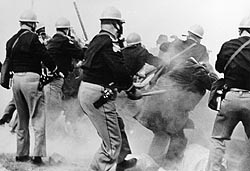By Bob Allen
The Southern Baptist Convention’s moral concerns agency announced plans Dec. 11 for a March summit on racial reconciliation responding to the deaths of African-American men in clashes with police in Ferguson, Mo., and Staten Island, N.Y.
“The Gospel and Racial Reconciliation,” the second annual leadership conference sponsored by the SBC Ethics and Religious Liberty Commission, is scheduled March 26-27, 2015, in Nashville, Tenn. It was orginally planned for 2016.
 “The New Testament is clear that the gospel reconciles us not only to God but also to each other,” said ERLC President Russell Moore. “Racism and injustice are not just social ills; they are sins against God. Racial reconciliation is a matter of what gospel we believe and to that mission we’ve been called. This summit will help equip us to tear down carnal divisions, to bring about peace, so that churches reflect the kingdom of God.”
“The New Testament is clear that the gospel reconciles us not only to God but also to each other,” said ERLC President Russell Moore. “Racism and injustice are not just social ills; they are sins against God. Racial reconciliation is a matter of what gospel we believe and to that mission we’ve been called. This summit will help equip us to tear down carnal divisions, to bring about peace, so that churches reflect the kingdom of God.”
Originally Moore planned to follow up his inaugural leadership summit on the gospel and human sexuality last April with a 2015 emphasis on the sanctity of life. Moore said plans for the original theme of “The Gospel for Life” will be integrated into a large-scale pro-life conference in Washington in partnership with the March for Life in 2016.
Moore has been vocal about racial reconciliation since the Eric Garner grand jury ruling, in particular expressing his views on Twitter:
I am astounded speechless by the #EricGarner case. Come, Lord Jesus.
— Russell Moore (@drmoore) December 3, 2014
Confirmed speakers for the race summit include John Perkins, president of the John and Vera Mae Perkins Foundation in Jackson, Miss.; Fred Luter, the first African-American president of the Southern Baptist Convention and pastor of Franklin Avenue Baptist Church in New Orleans; and H.B. Charles Jr., pastor of Shiloh Metropolitan Baptist Church in Jacksonville, Fla.
The leadership summit coincides with the 20th anniversary of a 1995 resolution on racial reconciliation adopted 150 years after the denomination was formed to defend the appointment of slaveholders as missionaries. The gathering will be held during the week of the 50th anniversary of the March 1965 five-day march from Selma, Ala., to Montgomery led by Martin Luther King Jr.
 On April 11, 1965, First Baptist Church in Montgomery turned away a group of black and white demonstrators seeking to attend Palm Sunday services. The pastor at the time described the group as “paid agitators” not from the city.
On April 11, 1965, First Baptist Church in Montgomery turned away a group of black and white demonstrators seeking to attend Palm Sunday services. The pastor at the time described the group as “paid agitators” not from the city.
In March 1965 Baptist Press described reaction by Southern Baptist leaders to voter-registration demonstrations and clashes with police in Selma as mixed.
A group of faculty members at Oklahoma Baptist University sent telegrams to Alabama Gov. George Wallace and officials of both the Alabama and Southern Baptist conventions denouncing police brutality during the March 7, 1965, clash remembered as “Bloody Sunday,” when state and local lawmen met some 600 protestors with night sticks and tear gas at Selma’s Edmund Pettus Bridge.
George Bagley, executive secretary of the Alabama Baptist State Convention, voiced regret over the death of James Joseph Reeb, a white Unitarian minister struck on the head who slipped into a coma and died two days later.
“However, it should be remembered that every community in America has a small element who are not Christians and who are uncontrollable and who can be led to such actions by one stimulus or another,” Bagley added.
An aide to Bagley said the question being asked by some in Selma was: “Are the continuing demonstrations merely vindictive, or are they designed to aid radical Negro organizations in national fund-raising efforts?”
